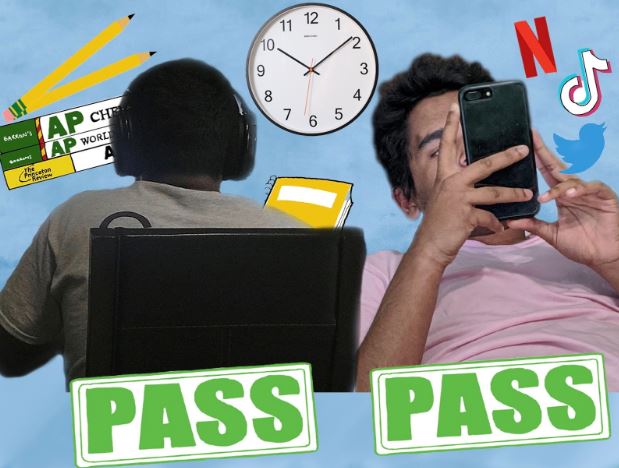Newly integrated pass/fail increases laziness/cheating
Due to COVID-19, Coppell ISD has implemented a pass/fail grading system for the final grading period. The Sidekick staff writer Meer Mahfuz explains the negative impact this can have on students and recommends the cut off grade be moved to 80.
April 23, 2020
In a time where we see many temporary systems and ideas being implemented, mainly due to the unfortunately devastating consequences of COVID-19, one system that I am not a fan of is the new pass/fail grading system, implemented for the fourth nine weeks.
The 5 major points of consideration that went into the implementation of the new grading system were as follows: the equity of instruction (platform of delivery face-to-face vs. distance learning), the length of time for school closure, the impact on a learner’s GPA Class Rank/GPA Cumulative Score, the family needs during this time and the flexibility during remote instruction.
While I do find some positive aspects of the new system, mainly the fact that grades will not impact students’ GPA, allowing students to prioritize their mental health, significantly lowering my stress levels and giving me more time to focus on my family, I do not think our new system is perfect.
The main issue that I find in the new system is that students who spend long hours on work will end off with the same result for this grading period as someone who does the bare minimum, maybe even less.
I can easily find a way to get at least a 70 or above in all of my classes, and that even includes not doing some assignments. At no point in time should I be able to get the same grade as someone who works 20 hours a week if I am only working 5 hours a week, with the numbers just being hypotheticals.
However, many students, myself included, have fallen victim to the procrastination that accompanies the seemingly endless amount of time that we have to complete our work. While the grading system is not necessarily at fault for this, as everyone procrastinates even during normal circumstances, the new grading system certainly doesn’t help curb laziness.
“Kids are going to start not doing their work because they’re going to settle for a lower grade [instead of] trying to get a higher one,” CHS9 freshman Preston Taylor said. “I don’t really think that it’s very fair those kids that are doing their assignments and working hard to keep their grade [are getting that same reward as] kids who aren’t putting as much effort in.”
The addition of pass/fail into the online schooling system has also allowed for cheating on assignments to be easier without getting caught. The ability to pick up my phone and text one of my friends for the answers on a certain assignment has never been easier. However, it is clear that any online learning circumstances, regardless of grading system, would see an increase in cheating, with the new grading system not playing a major part in the increase of cheating.
“The temptation [to ask one of my friends for answers] has definitely increased now compared to regular school,” CHS sophomore Colton Johnson said. “But, I always try to get all my work done on my own because I know that it’s what’s best for me.”
I propose that CISD should raise the passing cut-off to an 80 so that students are still encouraged to maintain high work ethics similar to the one they had during the year. This would also help ensure that the bad habits that stem from our system would not be maintained going into next school year with classes going back to being rigorous.
There would be exceptions, of course. Students who evidently struggled throughout the year or students whose specific home scenarios are more dire than others would work with teachers to ensure that they have an understanding of all content. The teacher’s home situation must also be accounted for. Students with teachers who are nursing ill family members or are unable to provide the necessary assistance for the student would be moved into another teacher’s group until further notice.
The pass/fail system also calls in to question how teachers, families and administrations assess students. Are higher grades dependent on more effort, or on a higher knowledge and understanding of content? Are assignments a measure of how much work students are doing, or whether they understand the course objectives?
“My personal hope is that [pass/fail] causes teachers, schools and students to really reflect on our practices.” CHS AP World History and AP Comparative Government teacher Shawn Hudson said.
Follow Meer (@meer_mahfuz) and @CHSCampusNews on Twitter.











